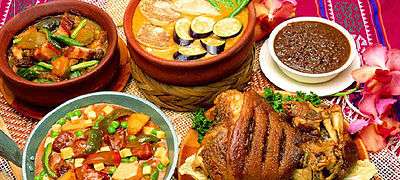Roscas (Filipino cuisine)
In Philippine cuisine, roscas or biscocho de roscas refers to a pastry cookie product from the province of Leyte, mainly from the towns of Barugo and Carigara, made from lard, anise, flour, sugar, butter, and eggs.[1][2][3] Roscas are initially shaped as crescents or penannular rings (hence the name——roscas is Spanish for "rings"). Each of the roscas is then cut in half before baking, resulting in two separate elbow-shaped cookies.[4]
.jpg) Two pieces of the Leyte "roscas" joined together for presentation. | |
| Alternative names | Rosca de biscocho |
|---|---|
| Type | Cookie, pastry, biscuit |
| Course | snack, dessert |
| Place of origin | Philippines |
| Region or state | Leyte and Samar |
| Main ingredients | lard, anise, flour, sugar, butter, and egg yolks |
| Variations | with tuba palm wine as liqueur ingredient |
While some claim that this pasalubong pastry cookie traces its history to the Spanish era,[5] others have indicated that roscas-making in Leyte was started in the town of Barugo by a returning migrant in the late 1960s whose success was replicated in the nearby town of Carigara and the far town of Calbayog in Samar province. What original dish the roscas derive from is unspecified, however.[6]
See also
- Half-moon cookie
- Biscocho
- Rosquillo
- List of Philippine desserts
References
- ""Roscas" makers in Barugo reels on drop of sales | Leyte Samar Daily News". www.leytesamardailynews.com. Retrieved 2017-02-18.
- "6 Native Delicacies You Should Taste When in Leyte | Trip the Islands | Travel the Best of the Philippines". triptheislands.com. Retrieved 2017-02-18.
- "Biscocho". About Filipino Food. Retrieved 30 January 2019.
- de Veyra, Jojo Soria (February 13, 2017). "Travel and Pop Semiotics: The Romance in Leyte's Broken Rings". diskurso.com: filipino art magazine online. Retrieved 2017-02-18.
- "Rice cakes, roscas, and more eats at the Samar Food Fest". GMA News Online. Retrieved 2017-02-18.
- Convergence for Enterprise Development, GREAT Women Project (January 2013). "Kneading Success for Barugo Roscas-Making" (PDF). Philippine Commission on Women Digital Library. Retrieved February 18, 2017.
